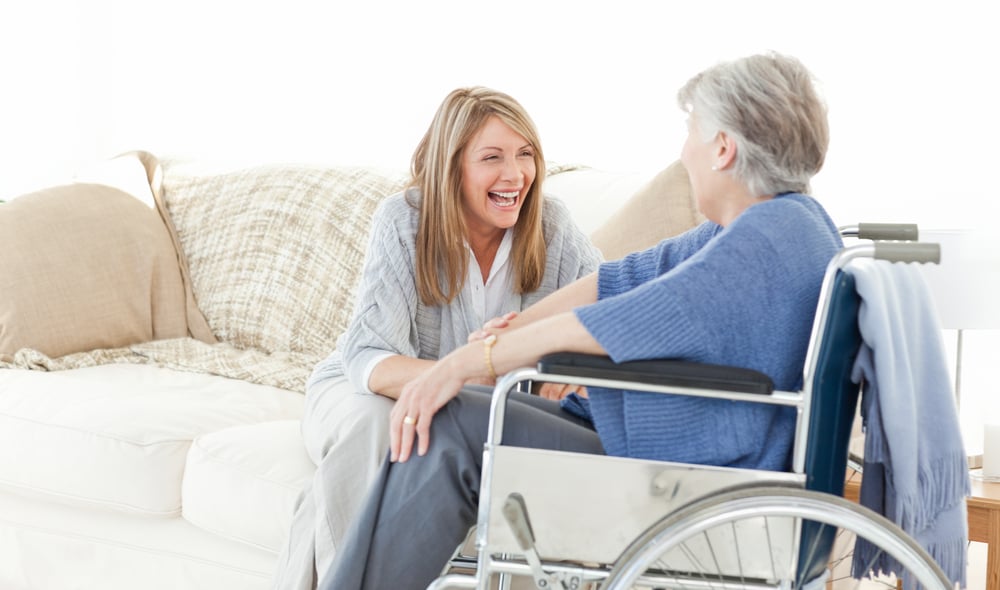Help for Caregivers: Alzheimer’s Psychosis Support Is Here
The ADEPT-4 clinical study is an opportunity for caregivers and their loved ones to access free, expert care while helping research a potential new treatment for Alzheimer’s-related psychosis.
A New Study Offers Hope for Managing Challenging Behaviors in Alzheimer's.
Caring for a family member with Alzheimer’s disease is challenging – especially when they experience psychosis, such as seeing or hearing things that aren’t there or holding false beliefs. In fact, around 40% of individuals with Alzheimer’s eventually develop these distressing hallucinations or delusions . The ADEPT-4 clinical study is an opportunity for caregivers and their loved ones to access free, expert care while helping research a potential new treatment for Alzheimer’s-related psychosis.
ADEPT-4 is a Phase 3 research study evaluating an investigational oral medication called KarXT for psychosis in Alzheimer’s disease. KarXT is approved by the U.S. FDA for the treatment of schizophrenia in adults. It is now being evaluated in clinical research for its potential to help manage psychosis in Alzheimer’s disease. The goal is to see if KarXT can safely and effectively reduce hallucinations and delusions in patients with Alzheimer’s, compared to a placebo (an inactive look-alike pill). KarXT has demonstrated promise in treating psychosis in adults with schizophrenia and is now being evaluated in clinical trials for its potential to treat Alzheimer’s-related psychosis.
The study is conducted locally by SC3 Research Group in Pasadena, so your loved one can participate close to home with support from a dedicated local team.
Who Can Participate? (Eligibility Criteria)

This study focuses on caregivers and their loved ones living with Alzheimer’s-related psychosis. Key eligibility criteria include:
-
Age 55 to 90: The patient (your loved one) is between 55 and 90 years old .
-
Diagnosis of Alzheimer’s Disease: The patient has mild to severe Alzheimer’s disease and is experiencing moderate to severe psychosis (for example, troubling hallucinations or delusions) .
-
Persistent Symptoms: Psychotic symptoms have been present for at least 2 months or more prior to screening .
-
Caregiver Involvement: Each participant will need a dedicated study partner—typically a caregiver—who can attend all study visits, help monitor medication use, provide updates on the participant’s well-being, and assist with completing questionnaires.
Having a consistent study partner is essential to ensure both safety and support throughout the study.
Benefits of Participating in the Alzheimer's Clinical Trial
By joining ADEPT-4, you’re not only exploring a potential new treatment for your loved one – you’re also joining a supportive community of caregivers and researchers working toward better care for Alzheimer’s. Participants in the study will have:

Potential access to the investigational drug that may help manage psychosis associated in Alzheimer's patients.
All study medication, clinic visits, lab tests, and procedures are provided free of charge. While improvement can’t be guaranteed, this study gives access to an investigational treatment (KarXT). Earlier research on the active component of KarXT, it has shown potential in reducing psychosis symptoms such as hallucinations and delusions in individuals with Alzheimer’s disease. Your loved one might experience relief from these symptoms, which could improve their quality of life and ease the caregiving burden.

Close care and monitoring from an Alzheimer's Disease specialist.
Your loved one will receive care at no cost from a local neurologist, a neuropsychologist, and experienced research staff who specialize in neurodegenerative disorders. This includes thorough health check-ups, memory assessments, and close monitoring of their condition throughout the study. Many caregivers find that being in a study provides extra support and medical attention for their loved one. We understand caregivers need care too, so we’ll provide information on caregiver support groups and strategies if desired.

Reimbursement for study-related time and travel expenses.
All study medication, clinic visits, lab tests, and procedures are provided free of charge. The study’s sponsor (Karuna Therapeutics) covers the costs – insurance is not required. Additionally, the study team can connect you with local Alzheimer’s support resources. Your family’s experience could lead to an approved treatment in the future that helps countless other families. Many caregivers find empowerment and hope in taking action against the disease.
What to Expect:
Visits, Timeline & Support
Participating in ADEPT-4 means you and your loved one will be closely supported by our team throughout the study. Here’s an overview of the study schedule and commitment:
-
Study Duration: ~20 weeks (about 5 months in total). This includes a screening period, a 14-week treatment period, and a follow-up check.
-
Number of Visits: Approximately 13 in-clinic visits over the 5 months (about 2–3 visits per month on average). This covers initial screening visits, regular monitoring visits during the 14-week treatment, and one follow-up visit about 2 weeks after treatment .
-
Screening (Weeks 0–4): First, the study team will conduct health assessments over up to 30 days to confirm eligibility . This may involve memory/cognitive tests, physical exam, and discussing medical history. There is no cost for these evaluations.
-
Treatment Period (14 Weeks): If eligible, your loved one will enter the treatment phase lasting 14 weeks (about 3½ months) . During this time, they will take either KarXT or placebo daily. Regular clinic visits (approximately every one to two weeks) will be scheduled to monitor their health and progress. At each visit, the caregiver and patient will meet with our study doctor and staff for check-ups, fill out questionnaires about symptoms and daily function, and receive the next supply of study medication. Dosing is flexible – the doctor may adjust the dose depending on how well your loved one tolerates the medication and how it’s working . Throughout, you are not alone – our team will check in on your loved one’s safety and answer questions at every step.
-
Follow-Up (End of Study): About 2 weeks after the 14-week treatment ends, there will be a final follow-up visit . The study doctor will conduct a last health evaluation to see how your loved one is doing after stopping the study drug. This marks the end of the main study.
-
Optional Extension: If the investigational drug seems to be helping and your loved one completes the 14-week study, they may have the option to continue in a 1-year Open-Label Extension (OLE) study . In that extension, all participants receive KarXT (no placebo) so that researchers can gather longer-term safety data and your loved one might continue to benefit from the study medication. Participation in the extension is voluntary and can be discussed upon finishing the main study.
During all these visits, you and your loved one will be treated with the utmost care and respect. Our clinic environment is designed to be comfortable and dementia-friendly, minimizing any stress. If travel or mobility is a concern, let us know – we can assist with accessible transportation arrangements or other accommodations to ensure you can attend visits. All study-related care, exams, and medications are provided at no cost to you. Plus, you may be reimbursed for travel expenses (such as mileage) – ask our team for details.
Questions & Answers
What is KarXT?
What is KarXT?
KarXT is an investigational medication that works differently than current treatments for psychosis. It combines two components: xanomeline, which activates specific receptors in the brain involved in learning and memory, and trospium, which helps reduce side effects. KarXT may help improve psychotic symptoms like hallucinations and delusions with potentially fewer side effects than existing medications.
Will my loved one receive KarXT?
Not in all cases. Participants in the study are randomly assigned to receive either KarXT or a placebo—a pill that looks the same but contains no active medication. This approach allows researchers to fairly evaluate how well KarXT works.
To ensure the study remains unbiased, neither you nor the study doctor will know which treatment is being given during the main part of the trial.
Where is the study taking place?
At SC3 Research Group, located at:
📍 960 E. Green Street, Suite 310, Pasadena, CA 91106
We offer free parking, wheelchair access, and caregiver-friendly facilities.
Can we leave the study if we wish to?
Yes. Participation is completely voluntary, and you or your loved one can leave the study at any time, for any reason, without penalty or loss of care. You’ll still receive any medical support needed, and leaving will not affect any other care your loved one receives.
What does participation in the study involve?
-
Around 13 in-clinic visits over 5 months
-
Daily medication (KarXT or placebo) taken at home
-
Health monitoring through checkups, labs, and questionnaires
-
A caregiver (like you) to accompany your loved one, give updates, and help with medication
-
Option to join an extension study where all participants get KarXT after the main study
What are the potential risks and benefits of participating?
Benefits may include:
-
Expert medical care at no cost
-
Potential improvement in hallucinations or delusions
-
Contributing to Alzheimer’s research
-
Support and resources for caregivers
Risks may include:
-
Side effects from the medication (e.g. nausea, dry mouth)
-
Time commitment for visits
-
Your loved one may receive placebo, not the active drug
All known risks are discussed in detail before joining, and your loved one’s safety is always the top priority.
Our Team & Location
SC3 Research Group is your local clinical research center located in Pasadena, CA, dedicated to neurological research. Our team understands the challenges of Alzheimer’s disease and is here to support you. The Principal Investigator, Dr. M. Lorraine Purino, MD, is a board-certified neurologist with extensive experience in memory disorders and clinical trials. Dr. Purino and her staff have a warm, compassionate approach – their mission is to make sure every caregiver and patient feels heard, safe, and valued.
When you visit our clinic, you’ll meet a small, friendly team including study coordinators, nurses, and clinicians who specialize in dementia care. We will take the time to get to know you and your loved one. You are not just a number to us – you’re part of our community. We strive to schedule visits at convenient times for you, and our site has free parking and easy access for patients with mobility needs (our facility is wheelchair accessible and dementia-friendly).
Here we are!
We encourage you to reach out with any questions or even visit our site to meet the team before deciding. Many of us are caregivers for family members too – we truly understand what you’re going through and are here to help.

A New Study Offers Hope for Managing Challenging Behaviors in Alzheimer's.
Recruiting

STUDY BROCHURE - Clinical Research Study for Psychosis- Associated with Alzheimer’s Disease
Downloadable
Contact Us – We’re Here to Help
Research has changed the way we diagnose, treat, and understand Alzheimer's disease and it's made only possible because of people with Alzheimer's Disease who participated in clinical trials. Join us in learning better about the condition while participating in studies that will shape the future of Alzheimer's Disease and the thousands of people affected by it.
Don't hesitate to contact us.
Roxanne Cabading
Patient Engagement, SC3 Research Group
+1-6262502070 x 799
roxanne.cabading@neurosearch-usa.com
960 E. Green St., Suite 310, Pasadena, CA 91106

-1.png?width=120&height=928&name=SC3%20-%20Ask%20The%20Expert%20Mar%2028%20(1)-1.png)